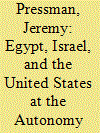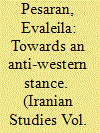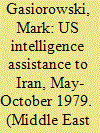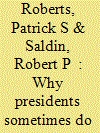| Srl | Item |
| 1 |
ID:
188636


|
|
|
|
|
| Summary/Abstract |
Most scholars writing on Arab-Israeli matters barely address the Egyptian-Israeli autonomy talks, and what has been written largely dismisses them as Egyptian and United States capitulation to Israeli expansion. But a focus on archival documents from the first months of the talks in 1979 demonstrates three points at odds with this conventional narrative. Whilst Egyptian negotiators were ultimately rebuffed, Egypt pushed for significant moves towards Palestinian national self-determination, especially in their proposal of 25 June 1979. Consistent with the Carter Administration’s mixed approach, the United States stood in a middle ground during these talks, sometimes siding with Egypt such as with the need for Palestinian representation and other times with Israel such as in discouraging political discussions. Lastly, by explicitly discussing which officials were at the table, we see the United States negotiating approach reinforces a notion from the mediation literature that sustained, high-level engagement is crucial if a mediating country hopes to achieve a breakthrough.
|
|
|
|
|
|
|
|
|
|
|
|
|
|
|
|
| 2 |
ID:
085332


|
|
|
|
|
| Publication |
2008.
|
| Summary/Abstract |
Ayatollah Montazeri was a Khomeinist who came to regret being Khomeini's unabashed proteg . Though he has never abandoned the doctrine of velayat-e faqih, he has sought to reconceptualize it by furnishing it with democratic principles. In this, he has not been credible, although he has managed to portray himself as a reformer among some Iranian activists who themselves have credible reformist credentials, such as Akbar Ganji. But other reformists believe that the principles of the mandate of the jurist permit authoritarian abuses. And those among them who seek a mujtahid's support for overthrowing that doctrine would prefer to turn to the writings of Ayatollah Dr. Mehdi Ha'iri (d. 1999).
|
|
|
|
|
|
|
|
|
|
|
|
|
|
|
|
| 3 |
ID:
085334


|
|
|
|
|
| Publication |
2008.
|
| Summary/Abstract |
The Iranian Revolution of 1979 saw the mobilization and cooperation of a variety of groupings that were brought together by their shared determination to overthrow the Shah. However, it was not only opposition to the Pahlavi regime, but also suspicion of and disdain for that regime's Western backers that united these revolutionary groups. Religious leaders (ulama), merchants (bazaaris), intellectuals and students alike all espoused the strong anti-Western sentiments that had been developing in Iran over the previous two decades. But what particular factors can be seen to have encouraged the adoption of these sentiments in the lead-up to the revolution, and in what ways were they articulated and subsequently put into practice by the leaders of the new regime? This article suggests that various domestic and international influences can be seen to have shaped the emergence of Iran's revolutionary discourse of "economic independence." In particular, the paper argues that a peculiar blend of Shi'i concepts of social justice and Marxist-Leninist discourses of class struggle and anti-imperialism not only informed the economic outlook of Iran's burgeoning revolutionary movement during the period 1953-79, but was also enshrined in the Constitution of the Islamic Republic.
|
|
|
|
|
|
|
|
|
|
|
|
|
|
|
|
| 4 |
ID:
118253


|
|
|
| 5 |
ID:
149502


|
|
|
|
|
| Summary/Abstract |
PATRICK S. ROBERTS and ROBERT P. SALDIN identify reasons why presidents sometimes do not use intelligence information. They argue that presidents may opt for “opacity” so as not to act on intelligence information that could upset the global strategic balance or their foreign policy interests. They discuss this phenomenon using as a case study the alleged Israeli-South African nuclear test in 1979.
|
|
|
|
|
|
|
|
|
|
|
|
|
|
|
|